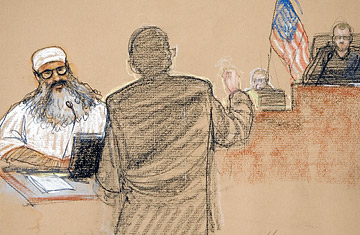
Khalid Sheikh Mohammed, left, is questioned at Camp Justice in Guantanamo Bay U.S. Naval Base, Cuba.
Although Osama bin Laden remains at large as President Bush's tenure winds down, the Administration clearly hopes that legal proceedings begun last week against Khalid Sheikh Mohammed and four alleged co-conspirators will offer a public demonstration that the alleged principal planners of the 9/11 attacks are finally being brought to justice. But their arraignment at Guantanamo on Thursday suggested that the political overtones of the case could call that effort into question and overshadow strictly legal aspects of the trial.
For the Bush Administration, which has held some of the defendants for five years of interrogation and torture at secret locations, the trial offers a timely opportunity to remind Americans of the terrorist threat. Showcasing sensational evidence of the 9/11 conspiracy will not only assist the trial and possible execution of its alleged perpetrators, it will bolster the Administration's approach to its continuing "global war on terror." Although few observers expect the latest court deadline to be met, prosecutors say they will be ready to start the trial on September 18, close to the anniversary of the 9/11 attacks — and also the point at which U.S. voters start turning their attention to election issues such as national security.
Preparations for the trial have already featured accusations of political manipulation, notably set forth by Air Force Col. Morris Davis, Guantanamo's former chief prosecutor. He has said under oath that the top legal advisor to Guantanamo's military commissions, Air Force Brig. Gen. Thomas Hartmann, interfered in his planning of trials at the base by demanding that he drum up "sexy," high-profile cases "with blood on them" to attract public support for convictions. That charge led a military judge several weeks ago to exclude Hartmann from further involvement in a prominent case. Davis has also accused the Pentagon's second-ranking civilian of telling him to quickly charge "high value" prisoners — like Mohammed — "because there could be strategic value before the [November] election." Both Hartmann and the Pentagon civilian, Deputy Defense Secretary Gordon England, have disputed those allegations, though not under oath.
The accused, meanwhile, may have a political agenda of their own in the proceedings: Mohammed and some of the other defendants have said explicitly that they do not recognize the authority of the court, branding it a political trial. At the apparent direction of Mohammed, confessed mastermind of the 9/11 attacks, the accused have also told the court they will represent themselves, albeit with some assistance from professional military and civilian lawyers. Mohammed, who repeatedly appeared to give courtroom instructions to his co-accused on Thursday, explained that he rejects the authority of the U.S. legal system and instead follows "God's law." He also said he welcomes a death penalty in order to "martyr" himself.
Lawyers for the accused also suspect a political motivation in the timing of the case, since both presidential candidates, John McCain and Barack Obama, have said they would like to close down Guantanamo. Given that possibility, and an expected Supreme Court ruling later this month on the rights of prisoners at Guantanamo, it is almost certainly in the legal interests of the accused to see trial proceedings delayed — at least until a new Administration in Washington potentially takes a different legal approach to dealing with terror suspects. The possibility of bringing the five accused to the U.S. and charging them in Federal court would grant them more legal rights than they enjoy under the Guantanamo system of military commissions.
Thursday's opening round suggested, however, that the case will pivot on two factors: the rulings and conduct of Judge Ralph Kohlman, the Marine colonel presiding over the trial; and the wily intentions of Mohammed, who seems to be guiding his fellow defendants and setting defense strategy.
Judge Kohlman must soon rule, for example, on whether Guantanamo's top legal adviser, Brig. Gen. Hartmann, has unduly interfered in the case. If the ruling should go against Hartmann, many observers believe he could be removed or forced to resign. And that might be important, because Hartmann has recently pushed hard to conduct trials as quickly as possible, although that haste was not evident during years when the accused were held in prison after their capture.
The judge will also have to respond to new complaints from defense lawyers that Mohammed is intimidating and trying to exercise control over at least two of his co-defendants, pressuring them to reject legal advice.
Mohammed and the others accused could also decide to remain in their cells and avoid future court appearances, an option Judge Kohlman has said they are free to exercise. Since all five have opted to legally represent themselves, if they also decided not to show up, that could speed the proceedings along by cutting down on legal maneuvers or the number of objections. A smoother, faster trial might well please the Bush Administration and perhaps even the al-Qaeda prisoners themselves, who are seeking to delegitimize the U.S. legal process and, if Mohammed is to be taken at his word, to pursue "martyrdom." Should the two sides concur on speeding the legal process for their own political reasons, the resulting trial is unlikely to create a convincing appearance of justice being done. And that, in the court of international public opinion, would probably register as a victory for al-Qaeda.
